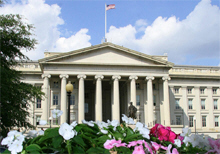
Typical street scene in Santa Ana, El Salvador. (Photo: iStock)
IMF Survey: Need to Contain Crisis, Rethink Financial System
October 7, 2008
- IMF calls for comprehensive approach to global credit turmoil
- Damage to real economy must be minimized
- Global regulatory system must be rethought
The turmoil in the global financial system will require a comprehensive effort by national authorities to restore confidence, get credit markets functioning properly again, and produce longer-term policies to rebuild the system, the IMF said in its Global Financial Stability Report.

U.S. Treasury Department building: U.S. measures to address financial crisis are "a step in the right direction," IMF says (photo: Karen Bleier/AFP)
GLOBAL FINANCIAL STABILITY REPORT
Authorities must develop a consistent and coherent approach to stem the credit crisis that had its origins in the U.S. subprime mortgage market. The report lays out five principles that can serve to guide the scope and design of measures to restore confidence:
• Employ measures that are comprehensive, timely, and clearly communicated.
• Aim for a consistent and coherent set of policies.
• Ensure rapid response on the basis of early detection of strains.
• Assure that emergency government interventions are temporary and taxpayer interests are protected.
• Pursue the medium-term objective of a more sound, competitive, and efficient financial system,
Minimize impact on real economy
The IMF said in its report, published on October 7, that the preeminent near-term challenge for policymakers is to break—and reverse—the negative feedback loop between the financial system and the real economy, in which financial institutions' distress leads to impaired credit intermediation and slower economic growth, which in turn leads to further credit deterioration.
The report noted that the U.S. authorities have abandoned their piecemeal approach to the credit crisis and are trying to develop a comprehensive and systematic strategy—both to encourage private markets to function again and facilitate the rebuilding of capital. Among other steps, the current plan provides for further liquidity support to the credit markets, frozen because institutions fear making loans to one another; purchasing problem assets to free up bank balance sheets; and extending deposit insurance.
But the IMF questions whether the new measures will be enough to restore confidence in the credit system, because many of the details have yet to be determined. But the IMF said it is a step in the right direction. The asset-purchase program must also be managed soundly and clearly set out its objective to develop public support.
Restoring confidence
To break and reverse the spiral afflicting financial markets and restore confidence, three interrelated areas need to be addressed simultaneously, according to the report: falling asset values, dysfunctional funding markets, and insufficient capital to support credit growth. Specifically:
• Capital: To keep credit extension positive while strengthening capital ratios, the report estimates some $675 billion of additional capital is needed by banks globally. With the ability to raise new private capital constrained, the authorities could consider injecting capital into viable institutions, coupled with the orderly resolution of nonviable banks.
• Funding: Because of the extreme difficulties in obtaining wholesale funding for many institutions, guarantees could be considered for senior and subordinated debt liabilities of banks for a temporary period of time. Deposit insurance of individual accounts could also be temporarily expanded beyond normal limits.
• Assets: Public sector balance sheets can be used to absorb assets to prevent "fire sale" liquidations that threaten to reduce bank capital. Countries whose banks have large exposures to problem assets could consider mechanisms for government asset purchases or funding through an asset management company to provide legal clarity and accountability.
Even as national authorities deal with the immediate crisis, they must also begin to think of the longer run. Because the turmoil has caused such an upheaval, pressure to protect current business practices and regulatory structures has lessened, freeing authorities to rethink the global financial architecture. The private sector has a role to play as well, the IMF said.
Rebuilding global regulatory system
"There is an opportunity and a need to move toward a macroprudential and regulatory architecture that is more integrated in its approach and uniform in standards, and that involves closer and more effective cross-border coordination and collaboration among supervisors, regulators and central banks," the report stated.
To improve the global financial structure, the IMF said:
• Authorities must ensure that firms' risk measurement systems take a sufficiently long-term perspective and establish standards for risk disclosure that are consistent not only across firms but also across borders.
• Banks and securities firms must improve their liquidity management, while central banks must have in place backstops that can be "applied quickly and flexibly in the event of system-wide pressures."
• Banks with significant activities in other countries must reassess their cross-border lending plans and authorities have to work on cross-border cooperation and contingency planning to ensure that domestic laws do not interfere with international cooperation, when dealing with firms operating in more than one country.
Comments on this article should be sent to imfsurvey@imf.org


